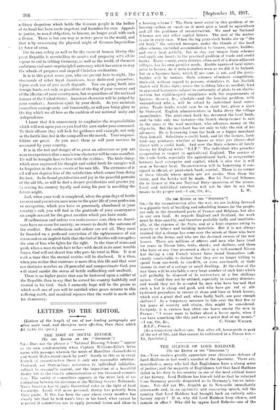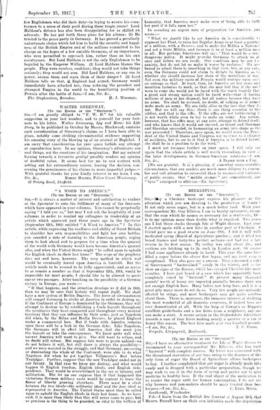THE SILENCE OF LORD HALDANE.
(To THE EDITOR CP THE "SPECTATOR.")
SIR,—Your readers greatly apprecinte your chivalrous defence of Lord Haldane in last week's number of the Spectator. There are, nevertheless, many who feel that Englishmen have a strong sense of justice; and the majority of Englishmen feel that Lord Haldane failed in his duty to his country in one of the most critical hours of her history. Lord Haldane has himself told us that he returned tem Germany gravely disquieted BR to Germany's future inten- tions. Yet—did trot Mr. Asquith go to Newcastle immediately afterwards and, in an eptimidie and reassuring speech, tell the country that Lord Haldane had brought hack an entirely satis- factory report ? If so, why did Lord Haldane keep silence, and remain in office T. Why-did-he oppose Lord Roberts—one of the lent Englishmen who did their duty—in trying to arouse his coun- trymen to a sense of their peril during those tragic years? Lord Haldane's defence has also been disappointing for so skilled an advocate. Ho has put forth three pleas for his silence: (1) He trusted to the peace party in Germany. It has proved a peculiarly unfortunate choice which led hint to build the seeurity and happi- ness of the British Empire and of the millions committed to his charge on the hopes of a few amiable Germans, of no importance, who were permitted to approach him, rather than on his own countrymen. But Lord Haldane is not the only Englishman to be beguiled by the Emperor William. (2) Lord Haldane blames the people. They were careless, confident; they would not take things seriously; they would not arm. Did Lord Haldane, or any one in power, arouse them and warn them of their danger ? (3) Lord Haldane tells us that, it England had armed, Germany would immediately have attacked her, thus reducing the proudest and strongest Empire in the world to the humiliating position of Prussia after the battle of Jena.—I am, Sir, &c..



























 Previous page
Previous page